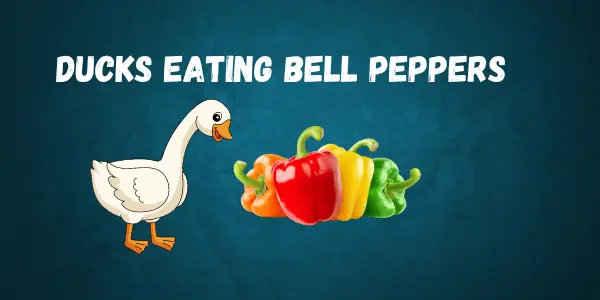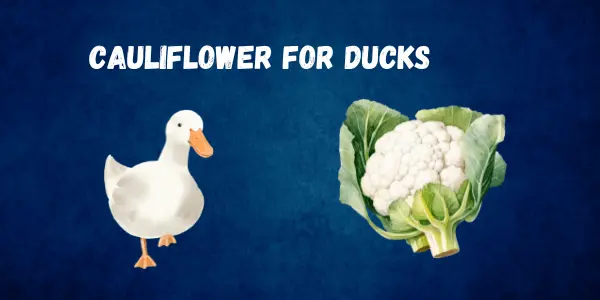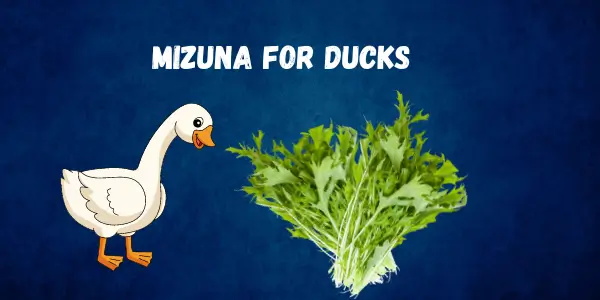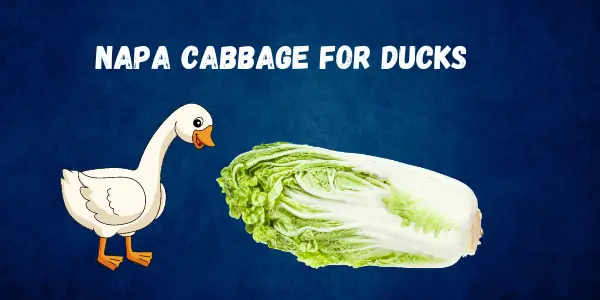Can Ducks Eat Broccoli?
Published: 9 Sep 2024
Ducks can eat broccoli, but it should be given in moderation. This vegetable contains essential nutrients that can support a duck’s diet, but some parts may be harder to digest. Both raw and cooked broccoli can be offered, but proper preparation is necessary to avoid potential digestive issues.
Do Ducks Eat Broccoli?
Ducks are naturally curious eaters and will often peck at different vegetables, including broccoli. Some ducks enjoy eating broccoli, while others may not show interest.
The texture and taste can influence their preference. If introducing broccoli for the first time, offering small pieces can help determine whether your ducks like it.

Is Broccoli a Healthy Choice for Ducks?
Broccoli provides several nutrients that contribute to a balanced diet for ducks. However, it should be fed alongside other vegetables and grains to ensure they receive all necessary nutrients.
Nutritional Value of Broccoli for Ducks
Broccoli is packed with vitamins and minerals beneficial for ducks. A 100g serving of raw broccoli contains:
- Vitamin C: 89 mg – supports the immune system
- Vitamin K: 101.6 mcg – helps with blood clotting
- Calcium: 47 mg – essential for strong bones and eggshell formation
- Fiber: 2.6g – aids digestion
- Antioxidants: Help reduce inflammation
These nutrients make broccoli a valuable addition to a duck’s diet when fed in appropriate amounts.
Health Benefits of Broccoli for Ducks
| Health Benefits of Broccoli for Ducks |
|---|
|
Feeding ducks broccoli in small amounts can provide several benefits:
Ducks that consume a varied diet with vegetables like broccoli may experience better overall health and nutrition balance. |
Potential Risks of Feeding Broccoli to Ducks
While broccoli is generally safe, there are some considerations:
- Oxalic Acid Content: Broccoli contains oxalic acid, which can interfere with calcium absorption if fed in large amounts. This may lead to weaker bones or eggshell issues.
- Digestive Issues: Ducks may struggle to digest large or tough pieces, leading to discomfort. Cutting broccoli into small bits can reduce this risk.
- Feeding Frequency: Too much broccoli can lead to an imbalanced diet. It should be an occasional treat, not a primary food source.
To minimize risks, serve broccoli in small portions alongside other nutritious foods.
Can Ducks Eat Raw Broccoli?
Ducks can eat raw broccoli, but it should be offered in small, manageable pieces. While raw broccoli retains its full nutritional value, its tough texture may be difficult for some ducks to chew and digest. Proper preparation ensures that ducks can safely consume this vegetable without any issues.
Is Raw Broccoli Safe for Ducks?
Raw broccoli is safe for ducks when fed in moderation. It provides essential vitamins and minerals, such as vitamin C, calcium, and fiber, which contribute to overall health. However, broccoli contains oxalic acid, which can interfere with calcium absorption when consumed in large amounts. This is especially important for laying ducks that need sufficient calcium for eggshell formation. Feeding raw broccoli occasionally, rather than daily, helps avoid any negative effects.
How to Feed Raw Broccoli to Ducks
To make raw broccoli easier for ducks to eat:
- Cut it into small pieces: Ducks have small beaks and no teeth, so large chunks can be difficult to swallow.
- Chop the florets finely: Smaller pieces reduce the risk of choking and aid digestion.
- Mix with other foods: Combining broccoli with grains or other vegetables makes it more appealing.
- Offer in water: Ducks enjoy foraging in water, and floating broccoli pieces can encourage natural feeding behavior.
By following these steps, ducks can safely enjoy raw broccoli as part of a varied diet.
Can Ducks Eat Cooked Broccoli?
Cooked broccoli is a good option for ducks, as it is softer and easier to digest than raw broccoli. However, cooking can reduce some of its vitamin content, so it should still be fed in moderation alongside other fresh vegetables.
Benefits of Cooked Broccoli for Ducks
Cooking broccoli breaks down its tough fibers, making it easier for ducks to chew and digest. Other benefits include:
- Easier digestion: Soft texture prevents choking or digestive discomfort.
- Better nutrient absorption: Ducks can process cooked vegetables more efficiently.
- Reduced oxalic acid levels: Cooking lowers oxalic acid content, which helps calcium absorption.
Despite these benefits, overcooking can lead to nutrient loss. Light steaming is the best method to retain as many vitamins as possible.
How to Prepare Cooked Broccoli for Ducks
When feeding ducks cooked broccoli, follow these guidelines:
- Steam or boil without salt or seasoning. Ducks should not consume added salt, butter, or spices.
- Chop into small, bite-sized pieces. This makes it easier for ducks to eat.
- Let it cool before serving. Hot food can harm ducks.
Offering cooked broccoli occasionally can be a safe and nutritious treat for ducks.
Can Ducks Eat Broccoli Stems and Stalks?
Broccoli stems and stalks are safe for ducks, but they are much tougher than the florets. Ducks may struggle to break down large or fibrous pieces, so preparation is key to ensuring they can eat them without difficulty.
Are Broccoli Stems Safe for Ducks?
Broccoli stems contain many of the same nutrients as the florets, including fiber, vitamin C, and calcium. However, their tough texture can make them difficult to chew. Chopping them into small, thin pieces makes them easier for ducks to consume.
Can Ducks Digest Broccoli Stalks?
Ducks can digest broccoli stalks if they are cut into small portions. However, large, fibrous stalks can be tough on their digestive system. To prevent issues:
- Peel and chop the stalks into thin slices. Removing the outer layer helps reduce toughness.
- Lightly steam the stalks to soften them. Cooking makes them easier to digest.
- Feed in small amounts. Too much fiber can cause digestive discomfort.
While broccoli stems and stalks are safe, feeding them in moderation alongside softer vegetables is ideal for maintaining a balanced diet.
Can Ducks Eat Broccoli Leaves?
Yes, ducks can eat broccoli leaves. These leaves are packed with nutrients, including fiber, calcium, and essential vitamins like vitamin C and vitamin K. Broccoli leaves are softer and easier to digest compared to the stalks, making them a good option for ducks.
However, they should be fed in moderation. Like the rest of the broccoli plant, the leaves contain oxalic acid, which can interfere with calcium absorption when consumed in large quantities. To keep ducks healthy, offer broccoli leaves as part of a varied diet that includes other vegetables and natural foods.
How Much Broccoli Should Ducks Eat?
Broccoli should be given as an occasional treat, not a primary food source. Ducks need a balanced diet that includes grains, proteins, and vegetables. Feeding too much broccoli can lead to digestive discomfort or interfere with nutrient absorption.
Feeding Guidelines for Ducks
- Serve in small amounts: A few small pieces of broccoli per duck, a couple of times per week, is enough.
- Chop into manageable pieces: Ducks do not chew their food, so cutting broccoli into small bits helps with digestion.
- Avoid feeding large quantities: Too much fiber can cause digestive issues.
- Combine with other foods: Mixing broccoli with grains, leafy greens, or fruits helps ensure a balanced diet.
Offering a variety of foods prevents nutrient deficiencies and supports overall duck health.
Can Ducklings Eat Broccoli?
Ducklings can eat broccoli, but extra care is needed to ensure they can digest it properly. Their digestive systems are still developing, so softer, more easily digestible foods are better. While broccoli is a nutritious vegetable, it should only be fed in small amounts to young ducks.
Is Broccoli Safe for Young Ducks?
Broccoli is safe for ducklings when prepared correctly. It contains essential nutrients like calcium, vitamins A and C, and fiber, which support growth and development. However, raw broccoli may be too tough for ducklings to chew and digest. Lightly steaming it makes it softer and easier for them to eat.
Precautions When Feeding Broccoli to Ducklings
- Introduce slowly: Start with tiny portions to see how they respond.
- Serve soft pieces: Steaming the broccoli helps with digestion.
- Monitor for digestive issues: Too much fiber can cause bloating or diarrhea.
- Limit frequency: Feeding broccoli once or twice a week is enough.
Providing ducklings with a diet that includes high-protein starter feed, small grains, and soft vegetables ensures they grow strong and healthy.
How to Prepare Broccoli for Ducks
Proper preparation makes broccoli easier and safer for ducks to eat. Follow these steps to ensure they get the most nutritional benefits:
- Wash thoroughly: Remove any pesticides or dirt before serving.
- Chop into small pieces: Ducks cannot chew food, so small bits prevent choking.
- Offer raw or cooked: Raw broccoli retains all nutrients but should be finely chopped. Light steaming makes it softer and easier to digest.
- Avoid seasonings: Never add salt, butter, or spices, as these can be harmful.
- Mix with other foods: Combining broccoli with grains or leafy greens provides a more balanced diet.
By following these guidelines, you can safely include broccoli as part of your ducks’ diet while ensuring they get proper nutrition.
Cutting Broccoli into Small Pieces
Ducks do not chew their food, so cutting broccoli into small pieces is essential for safe consumption. Large chunks can be difficult to swallow and may pose a choking risk.
- Chop florets and stems into bite-sized pieces to make them manageable.
- For ducklings, cut even smaller or lightly steam the broccoli to soften it.
- Avoid long stalks as they can be tough and harder to digest.
By preparing broccoli in small pieces, ducks can eat it comfortably without digestive issues.
Mixing Broccoli with Other Duck Foods
Broccoli should not be the only vegetable in a duck’s diet. Mixing it with other nutritious foods ensures balanced nutrition.
- Combine broccoli with grains like oats or corn to add variety.
- Mix with leafy greens such as kale or lettuce for added vitamins.
- Blend with fruits like diced apples or berries to encourage eating.
Offering broccoli as part of a mixed meal helps ducks get a wider range of nutrients.
Serving Broccoli in Water
Ducks naturally forage in water, so serving broccoli this way mimics their feeding behavior.
- Float small broccoli pieces in a shallow water dish to make eating more enjoyable.
- This helps clean the vegetable while encouraging natural foraging instincts.
- Ensure pieces are small enough to prevent choking hazards.
Serving in water keeps ducks engaged while allowing them to eat safely.
What Other Vegetables Can Ducks Eat?
A varied diet is important for ducks’ health. Along with broccoli, they can safely eat many other vegetables.
Leafy Greens Ducks Can Eat
Leafy greens provide essential vitamins and fiber. Safe options include:
- Kale
- Spinach (in small amounts due to oxalates)
- Romaine lettuce
- Swiss chard
- Collard greens
These greens support digestion and overall health.
Other Healthy Vegetables for Ducks
Besides leafy greens, ducks can eat:
- Carrots (chopped or shredded)
- Peas (fresh or frozen, never canned)
- Zucchini (sliced into small pieces)
- Cucumbers (hydrating and easy to digest)
- Bell peppers (a good source of vitamins)
Feeding a variety of vegetables ensures ducks get a well-rounded diet.
Conclusion: Should You Feed Broccoli to Ducks?
Yes, ducks can eat broccoli, but it should be given in moderation. Broccoli is packed with essential vitamins, minerals, and fiber, making it a nutritious treat. However, large amounts may cause digestive issues due to its fiber content and oxalic acid.

- Be Respectful
- Stay Relevant
- Stay Positive
- True Feedback
- Encourage Discussion
- Avoid Spamming
- No Fake News
- Don't Copy-Paste
- No Personal Attacks

- Be Respectful
- Stay Relevant
- Stay Positive
- True Feedback
- Encourage Discussion
- Avoid Spamming
- No Fake News
- Don't Copy-Paste
- No Personal Attacks





